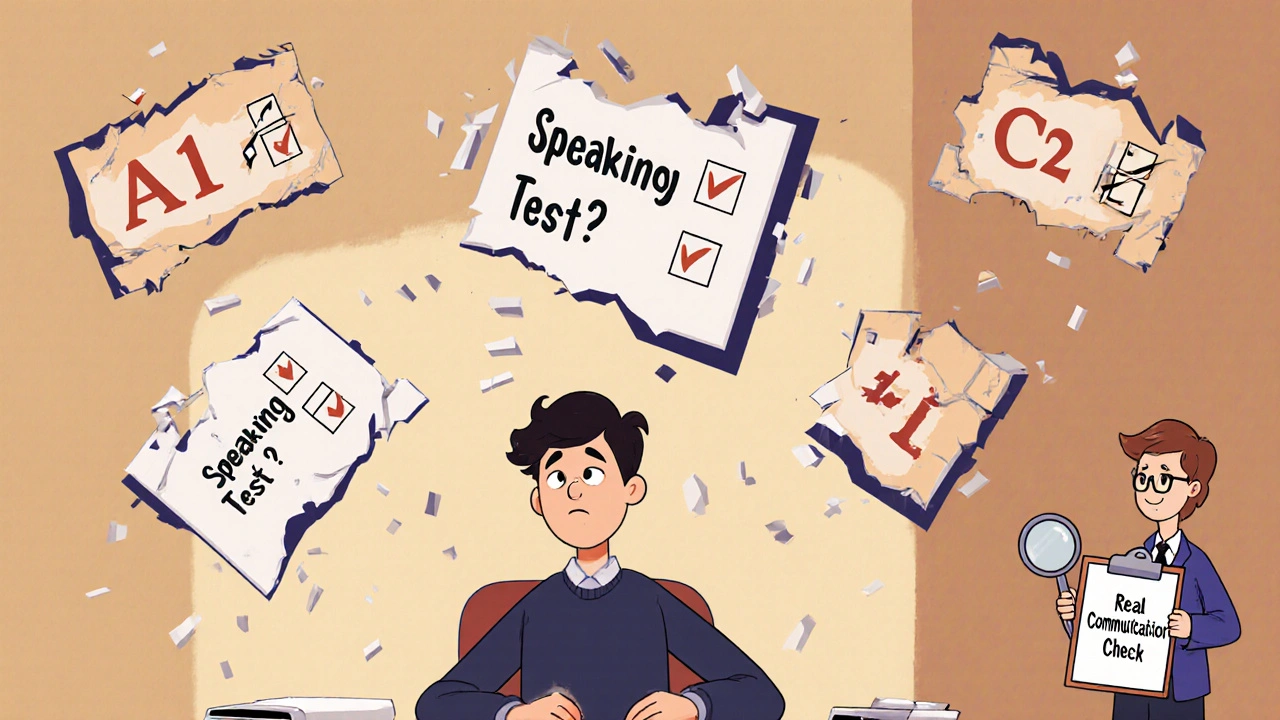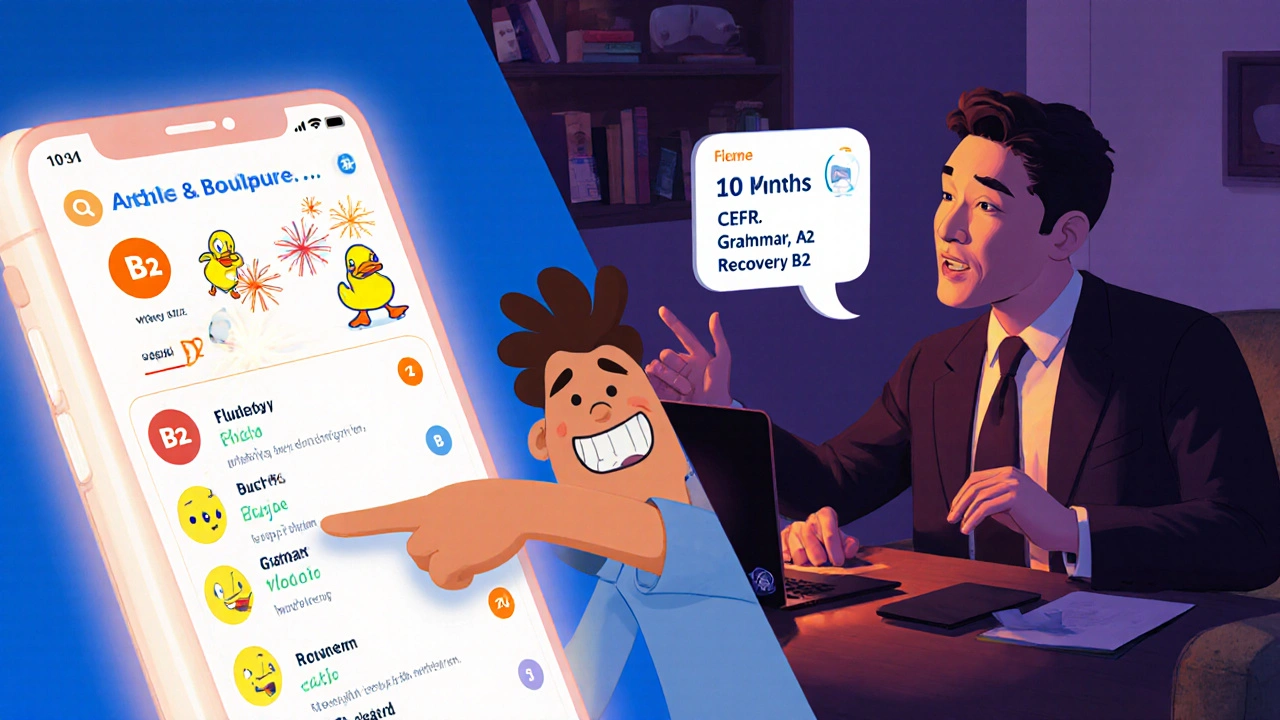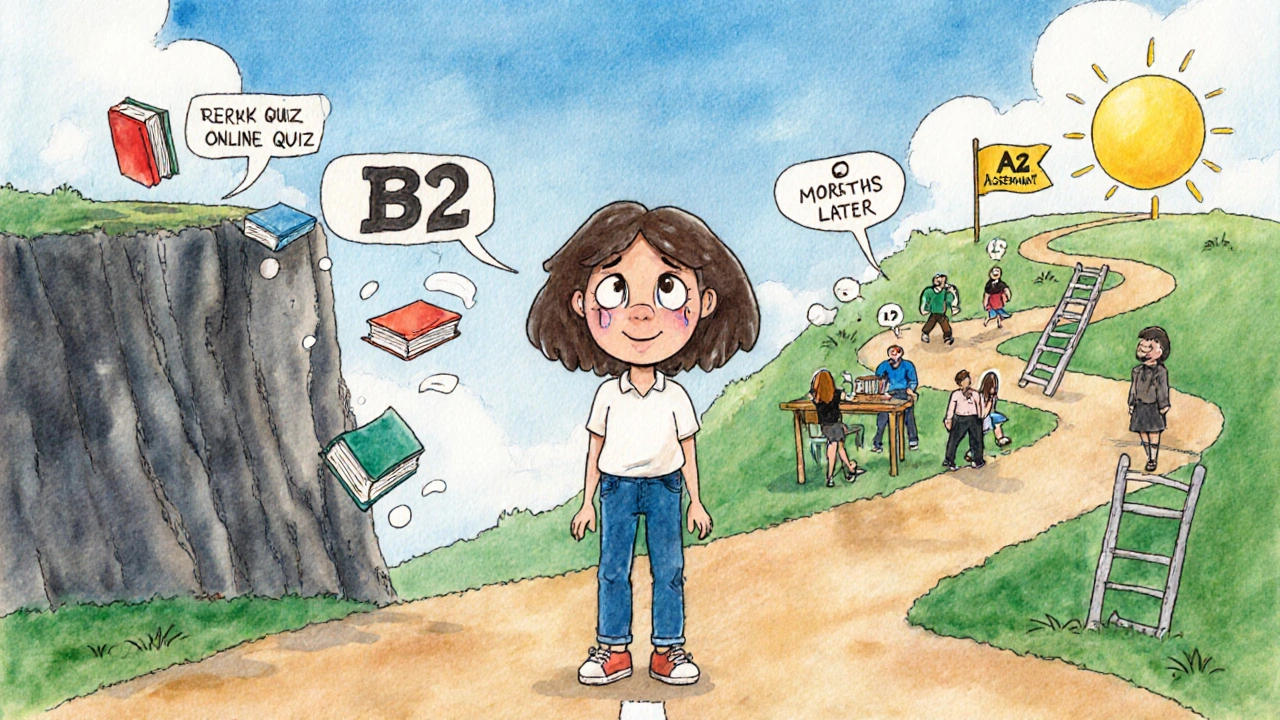Placement Tests for Language Courses: How to Accurately Assess CEFR Levels
 Nov, 16 2025
Nov, 16 2025
Ever started a language course only to feel completely lost-or worse, bored because everything was too easy? That’s usually not because the course is bad. It’s because the placement test didn’t work.
Most language schools and online platforms use CEFR levels-A1, A2, B1, B2, C1, C2-to group learners. But not all placement tests are created equal. Some are just quick quizzes. Others are full oral interviews with certified evaluators. The difference? Accuracy. And accuracy determines whether you actually learn-or just waste time.
What CEFR Levels Really Mean
The Common European Framework of Reference for Languages (CEFR) isn’t just a fancy label. It’s a globally accepted standard that breaks language ability into six clear levels. Each level describes what a learner can do in reading, listening, speaking, and writing.
At A1, you can introduce yourself and ask basic questions like “Where is the bathroom?” At B2, you can hold a detailed conversation about climate change or your job. By C1, you can write a formal report or understand nuanced humor in a movie. These aren’t guesses. They’re based on real-world tasks.
Most language programs use CEFR because it’s objective. But here’s the catch: if your placement test doesn’t match the CEFR descriptors, you’ll be placed in the wrong class. And that leads to frustration, dropouts, or slow progress.
How a Good Placement Test Works
A solid placement test doesn’t just ask multiple-choice questions. It mimics real communication. The best ones combine three parts: a written section, a listening section, and a short speaking interview.
The written part tests grammar, vocabulary, and reading comprehension. It’s not about memorizing rules-it’s about understanding context. For example, instead of asking “What’s the past tense of ‘go’?”, a good test might give you a short email and ask you to pick the best response.
The listening section uses real audio-accents, speeds, background noise. You’re not listening to a studio-perfect recording. You’re listening to how people actually talk. That’s how you know if someone can handle a real conversation in a café or on a train.
The speaking part is the most important. A 5-10 minute interview with a trained assessor can tell you more than 50 multiple-choice questions. The assessor doesn’t just check for correct grammar. They look for fluency, spontaneity, and the ability to recover from mistakes. Can you explain your weekend plans without pausing every two words? Can you argue your opinion when challenged? That’s B1 territory.
Why Online Quizzes Often Fail
Many apps and websites offer free “CEFR level tests.” They’re fast. They’re easy. And they’re often wrong.
Here’s why: they rely on grammar drills and vocabulary quizzes. They assume that knowing 1,200 words means you’re B1. But that’s not how language works. Someone might know all the words for food and ordering in a restaurant but freeze when asked about their childhood. That’s not B1. That’s A2 with a good memory.
A 2023 study by the European Language Council found that 62% of learners who took online quizzes placed themselves one full CEFR level higher than their actual ability. That’s not a small error. It’s the difference between understanding a news article and understanding a TED Talk.
These tests also ignore speaking and listening-two of the most critical skills. If you can’t respond in real time, your written score doesn’t matter.

What Schools and Platforms Get Right
Some institutions have figured it out. Universities like the University of Cambridge and language schools like Alliance Française use multi-stage assessments. They start with a written test. If you score in the middle range, you get invited for a 10-minute video call with a certified evaluator.
At the Alliance Française, the evaluator follows a standardized rubric based on CEFR descriptors. They don’t grade perfection. They grade functionality. Did you use past tense correctly? Did you ask follow-up questions? Could you keep the conversation going without relying on “um” and “like”?
Online platforms like Busuu and Lingoda have also improved. They now use AI-powered speaking tests that analyze pronunciation, fluency, and grammatical accuracy. But even these tools still require human validation for borderline cases.
The key? No single test is perfect. But combining automated scoring with human judgment cuts errors by over 70%.
What You Should Do Before Signing Up
Before you enroll in any language course, ask these questions:
- Is the placement test aligned with official CEFR descriptors? (Look for references to the Council of Europe’s framework.)
- Does it include a live or recorded speaking component?
- Who conducts the assessment? Is it a certified teacher or just a bot?
- Can you see your results broken down by skill (reading, listening, speaking, writing)?
- Is there a chance to retake the test if you feel it was inaccurate?
If the answer to any of these is “no,” keep looking. A course might be cheap or convenient, but if you’re placed wrong, you’ll pay in lost time and motivation.

Real-World Example: What Went Wrong
Meet Maria. She took an online quiz and scored “B2.” She signed up for a B2 Spanish course. Two weeks in, she couldn’t follow the discussions. The teacher talked about political debates and cultural references. Maria had never heard those words before. She felt embarrassed. She dropped the course.
Later, she took a test at a local language center. The assessor asked her to describe a recent trip, explain why she chose to learn Spanish, and react to a short audio clip of a market vendor. She was placed at A2.
She started over. Within six months, she reached B1. She didn’t just learn vocabulary. She learned how to speak.
Placement Isn’t a One-Time Thing
Placement tests aren’t just for beginners. Even advanced learners can benefit from reassessment. After six months of study, your skills might have shifted. Maybe you’re ready to jump from B1 to B2. Or maybe you plateaued and need a different approach.
Good programs offer mid-course evaluations. They don’t just check progress. They check alignment. Are you still in the right group? Are the materials still challenging? That’s how you stay motivated.
Final Tip: Trust the Process, Not the Score
CEFR levels aren’t trophies. They’re road signs. A B2 score doesn’t mean you’re fluent. It means you can handle most everyday situations. A C1 doesn’t make you a native speaker. It means you can write a professional email without checking a dictionary.
Don’t chase a high score. Chase the right level. The goal isn’t to prove you’re good. The goal is to learn faster.
Put in the time. Find a program that tests you properly. And don’t be afraid to start lower than you think. You’ll go further that way.
Can I take a CEFR placement test for free?
Yes, many platforms offer free tests, like the EF SET or Cambridge’s free sample tests. But free tests often lack speaking components or human evaluation. Use them to get a rough idea, not a final placement. For accurate results, pay for a test with live assessment.
How long does a CEFR placement test take?
A basic written and listening test takes 30-45 minutes. If it includes a speaking interview, add another 10-15 minutes. Full assessments usually last under an hour. Avoid tests that take less than 20 minutes-they’re too shallow to be reliable.
Do all language schools use CEFR?
Most reputable schools and universities do. Some private tutors or apps use their own scales, like “Beginner,” “Intermediate,” or “Advanced.” These are vague and inconsistent. Always ask if the school uses CEFR and request their official level descriptors.
Can I skip levels if I’m confident?
Technically, yes-but only if the placement test proves it. Confidence doesn’t equal ability. Many learners think they’re ready for B2 because they’ve studied for a year. But without speaking practice, they’re still stuck at A2. Let the test decide, not your gut.
What if I disagree with my placement?
Ask for a review. Reputable programs allow appeals. Bring examples of your work, recordings of your speaking, or proof of prior study. If they refuse to reconsider, that’s a red flag. A good program values accuracy over enrollment numbers.
Aimee Quenneville
November 17, 2025 AT 07:53Turns out I was A2. Now I'm B1. And I finally understand why people say 'I'm just here for the vibes'.
Marissa Martin
November 17, 2025 AT 09:11It's not about ego. It's about not wasting your life.
Cynthia Lamont
November 18, 2025 AT 18:53AI doesn't know when someone's pausing because they're thinking or because they're terrified. It doesn't catch the subtle shift in tone when you're lying about your weekend. It doesn't notice the way someone says 'um' five times before admitting they're scared.
Human evaluators aren't perfect. But they're the only ones who see the person behind the grammar.
And if your platform says 'B2' after 15 multiple choice questions? That's not a test. That's a scam.
Also, 'CEFR' isn't a brand. Stop capitalizing it like it's a luxury product.
James Winter
November 19, 2025 AT 12:18My cousin took a test in Quebec. Failed. Got put in A2. She screamed. Then she learned. Now she teaches.
US schools? They just give you a sticker and call it a day. That's why nobody speaks anything here.
Jasmine Oey
November 19, 2025 AT 15:17Turns out I couldn't say 'I'm allergic to peanuts' without looking it up.
My teacher looked at me like I'd just admitted I thought the moon was made of cheese.
She said: 'You don't need fancy words. You need to be able to ask for a bandage.'
So I started over. At A1.
Now I can talk to my Spanish neighbor about her dog, her kids, and why the Wi-Fi sucks.
That's better than any B2 certificate.
Also, I misspelled 'bandage' in my first essay. I cried. Then I laughed. Then I learned.
CEFR isn't about perfection. It's about not being a walking dictionary that can't hold a conversation.
Liam Hesmondhalgh
November 19, 2025 AT 15:31I learned Spanish by watching telenovelas and yelling at my abuela when she corrected me
My level? Idk
I can flirt in Spanish I can argue about politics I can beg for more tamales
Do I have a certificate? No
Do I speak? Yes
Stop making language a competition
Dmitriy Fedoseff
November 20, 2025 AT 04:21When you're placed wrong, you're not just learning grammar-you're learning shame.
Maria didn't fail because she was bad. She failed because the system didn't see her.
It saw her score. Not her fear. Not her curiosity. Not the way she smiled when she finally understood a joke in Spanish.
CEFR is a tool. But tools don't teach people. People teach people.
And if your placement test doesn't make room for humanity? It's not just inaccurate. It's cruel.
Meghan O'Connor
November 20, 2025 AT 23:25But I also know that 90% of these 'placement tests' are garbage.
One time I took a test that asked me to choose between 'I have been to Paris' and 'I went to Paris'.
It was a trick question. Both are correct.
They marked me wrong.
So I was placed lower.
Then I got into a class where the teacher said 'they was' for 3 weeks.
So now I'm just learning how to unlearn bad grammar while pretending I'm not screaming inside.
CEFR is fine. The tests? Not even close.
Kirk Doherty
November 22, 2025 AT 13:26Turns out I could already understand podcasts.
So I stopped going.
Learned on my own.
Now I'm C1.
My certificate says A2.
Does it matter?
No.
Morgan ODonnell
November 23, 2025 AT 06:45Turns out he memorized phrases from a textbook.
He had no idea how to respond to 'How are you?' if it wasn't scripted.
That's when I realized: language isn't about what you know. It's about what you can do.
And the best tests? They don't test knowledge. They test courage.
Patrick Tiernan
November 24, 2025 AT 20:20if you can talk to a person without your face turning red you're good enough
the rest is just corporate nonsense
also why are we still using CEFR like its the bible
its 2025 we have ai and still people are getting judged by a 2001 standard
just learn and shut up